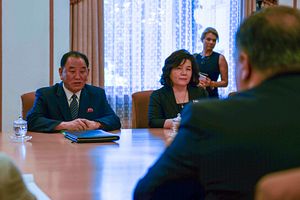The United States and North Korea are talking again—and it’s not going particularly well.
It would be understatement to say that U.S. Secretary of State Mike Pompeo’s recent trip to Pyongyang, to seek implementation of the June 12 summit declaration between U.S. President Donald J. Trump and North Korean leader Kim Jong Un, came up short on results.
As Pompeo left Pyongyang, North Korean state media carried a consequential statement from the country’s Foreign Ministry on the outcome of the talks and the state of negotiations generally between the two countries. The July 7 statement merits a close reading.
“We expected that the U.S. side would bring itself with a constructive proposal,” it begins, before moving on to mention that the U.S. position at the meeting was “so regretful.” The headline-grabbing phrase followed later: the Foreign Ministry took aim at Pompeo’s “gangster-like demands for denuclearization just calling for CVID, declaration, and verification, all of which run counter to the spirit of the Singapore summit meeting and talks.” These demands were, above all, “unilateral.”
Unilateral disarmament is not on the agenda for North Korea in 2018—and it wasn’t in 2017, 2016, or any year prior under Kim Jong Un. In fact, on May 16, Kim Kye Gwan, North Korea’s first Vice-Minister of Foreign Affairs, made clear the circumstances that would allow the June 12 summit in Singapore to proceed. Kim was responding to comments by Trump’s national security adviser, John Bolton, who advocated the ‘Libya model’ for North Korea.
On that day, Kim noted that “if the U.S. is trying to drive us into a corner to force our unilateral nuclear abandonment, we will no longer be interested in such dialogue and cannot but reconsider our proceeding to the DPRK-U.S. summit.” (Days later, Trump would cancel the summit before it would be reconstituted.)
One can’t fault North Korea for deceiving the administration on offering unilateral disarmament. Read the texts of the Singapore summit and even the inter-Korean Panmunjom declaration on April 27 and you’ll find references to North Korea agreeing to “complete denuclearization,” which means something else entirely.
“Complete denuclearization” of the Korean Peninsula does not mean the same thing as “the final, fully-verified denuclearization of the DPRK, as agreed to by Chairman Kim in Singapore,” as Heather Nauert, the State Department’s spokesperson put it days before Pompeo’s trip. The former can imply anything from total global nuclear disarmament to more modest arms control on the Peninsula; the latter implies an agreement to unilateral North Korean disarmament that simply does not exist.
Pompeo’s trip to Pyongyang not only did not produce results, but it also failed to disabuse him of the notion that Kim Jong Un has not offered to disarm—if he does know, he’s not letting it on at the risk of disappointing Trump.
During a press conference in Tokyo with the foreign ministers of Japan and South Korea on Sunday, Pompeo implied that sanctions relief for North Korea would only come after the “final, fully verified denuclearization, as agreed to by Chairman Kim, occurs.”
Whatever else can be said about the outcomes of Pompeo’s trip, the biggest takeaway is that the United States will be marching head first into a brick wall in negotiations with North Korea if its position continues to rest fundamentally on North Korean unilateral disarmament. This is a fact and the North Koreans have been clear about it in this round of diplomacy.
It’s true that North Korea will seek to slow-roll concessions and toy with the United States in the meantime. Additionally, the question of sequencing has emerged, with the July 7 Foreign Ministry statement implying that denuclearization can only proceed after a fundamental change in the nature of the U.S.-North Korea relationship and the establishment of a peace regime on the Peninsula per the Panmunjom declaration.
Diplomacy with North Korea was never going to be easy—even after the historic Singapore summit. The Trump administration remains under the impression that Kim Jong Un signed on to unilaterally disarm; as long as that impression persists and remains the fundamental on which the U.S. negotiating position is based, both sides will be hard pressed to find a mutually acceptable set of concessions.
The process hasn’t fallen apart just yet, however. The July 7 North Korean statement takes its eyes of Pompeo’s trip and hearkens back to the summit: “Chairman Kim Jong Un expressed his expectation and conviction that good personal relations forged with President Trump and his sentiments of good faith built towards the latter at the Singapore summit and talks would be further consolidated through the process of future dialogues such as high-level talks this time.”
The message from North Korea is simple, if unpalatable for the U.S. cause of disarmament: forget unilateral disarmament and change the fundamental nature of the U.S.-North Korea relationship building off the agreement in Singapore and we can start talking about arms control and even caps.
































